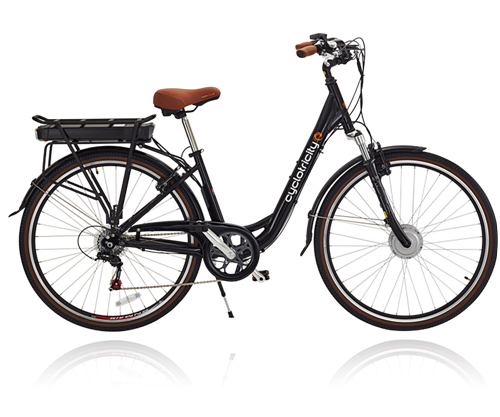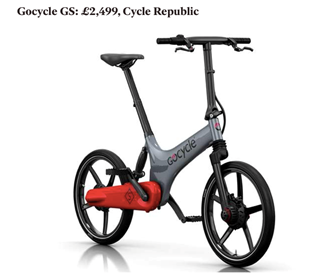Douzenier's individual views – Sustainable Transport for Guernsey

The last few years have seen a quiet revolution in personal transport with rapidly advancing technology meaning that finally, electric vehicles (EVs) are a competitive alternative to their petrol and diesel counterparts.
Guernsey is arguably better placed than many jurisdictions for EVs with short journeys, lower speeds and a road network proving tricky for bus operators.
In the UK and the Continent, range anxiety is potentially a valid reason for many people to still favour vehicles powered by traditional means. Range anxiety simply doesn’t apply in Guernsey!
Of course the EV sector is not limited to cars and 2018 saw the successful (and some would say controversial) States-backed scheme which enabled discounts for those purchasing electric bicycles.
There are several questions however:
- Is the current electric bicycle legislation appropriate?
- Does it encourage people to use electric bicycles
- Are we correct in looking at other jurisdictions for our legislation?
The Motor Vehicles (Electrically Assisted Pedal Cycles) (Exemption) (Guernsey) Law, 2002, states broadly that:
- Fourteen is the minimum age permitted to ride an electrically assisted bicycle
- The maximum weight of the bicycle is 40kgs (or 60kgs for a tandem or tricycle)
- The bicycle Is fitted with pedals which can propel it
- The electric motor’s continuously rated output is no more than 250 watts*
- It cannot be propelled (with assistance) at more than 15.5 mph
*The original law stated 200 watts but this was changed later which brought it into line with UK legislation.

Electric bicycles are slightly heavier than a standard bicycle due to the additional weight of the motor and battery. That said, modern technology and construction methods mean that in general, all bicycles have got progressively lighter over the last 40 years or so meaning that a good quality electric bicycle need not weigh that much more (if at all) than an ordinary bicycle from 40 years ago. (Of course the weight of the rider varies enormously)
Additionally, powerful disc brakes are now regularly fitted to electric bicycles which are less susceptible to rain and damp.
Of course electric bicycles not a solution for everyone - and here is the crux of the matter. There are those people for whom 15 mph is not fast enough to get from one end of the island to the other for example. Yes it’s possible to go faster than 15 mph but then, you’re on your own. The assistance stops and you’re back to riding what is in effect a normal bicycle. You arrive at your destination looking (and feeling) like you have undertaken significant exercise - because you have!
So what is the reason for the 15 mph limit on assistance? In fact, what is the reason for legislation at all?
To answer these questions we must first look at existing bicycle legislation (or the lack of it). Broadly it seems to be as follows:
- Bicycles should be roadworthy and safe (PC Derham springs to mind here)!
- They need to have a bell (or other means of audible warning)
- Riders are subject to the normal rules of the road (lights, speed limits etc.)
However, there is no minimum age to ride a bicycle on the road and the wearing of a bike helmet is not mandatory. Insurance or registration is also not a requirement.
- So it is entirely possible for a fifteen year old to ride a standard bicycle at 25mph (or more) without any insurance and without a crash helmet.
- It is possible for an eleven year old to pedal down the hill towards the Imperial achieving significant speeds again, without a crash helmet.
- Riders of sleek, lightweight racing cycles can probably boast greater speeds than this - at least most of them are sensible enough to wear a crash helmet!
We have absolutely no legislation to restrict the above activities (except for the normal rules of the road) and, I suspect it would take a brave politician to try to introduce any. In these days of environmental awareness, this would be a massively counter intuitive step.
So if EVs are the future, (including electric bicycles) why do we feel the need to legislate at all?
 Safety?
Safety?
Based on the above paragraphs regarding standard bicycles clearly this is not a reason to legislate for electric bicycles.
- Both types can achieve similar maximum speeds depending who is riding them.
- Both are subject to the speed limits on Guernsey roads.
- Pedestrians are in no more danger from electric bicycles that they are from standard ones - as the combined rider/bicycle weight can vary hugely - probably more dependant on the rider!
Pollution?
Absolutely no reason to legislate here if you look at the facts!
Electric bicycles are powered by clean energy. The vast majority of our electricity comes from French nuclear or hydroelectric sources. Photovoltaic solar panels are now a feasible option for many homeowners and these are bound to increase over the coming years generating their own power for exactly this sort of use.
Electric bicycles produce no noise pollution whatsoever and many people have to look twice to see if the bicycle they are following is electric or not.
I can’t actually think of another reason to legislate!
It would seem that the arrival of the electric bicycle in Guernsey prompted our legislators to lazily look around at other jurisdictions* and broadly mirror what they had chosen. The default setting was seemingly, “it has a motor - we must legislate!”
- *Other jurisdictions where the national speed limit is twice that of Guernsey.
- *Other jurisdictions where the daily commute may be anything up to a couple of hours by car.
We constantly hear about the benefits of choosing to leave the car at home and use a different method for commuting however:
- Buses are great but will never work for everyone.
- Walking is fine if you have the time - many don’t.
- Cycling (on a standard bicycle) is also fine if one is able to shower at work - not all can.
- Cycling (on an electric bicycle) may be feasible unless you have a tight schedule in different parts of the island.
Like it or not, islanders have hectic schedules and, those with children of school age especially, find it difficult to be in the right place at the right time (work, nursery, school gate etc.) when travelling at the legal limit, let alone at 15 mph.
I left my office at 3pm the other day to visit a building site which (Google tells me) is 7.3 miles away.
16 minutes by car (I timed it)
29 minutes at a constant 15 mph, however this doesn’t allow for traffic lights and other junctions). Google gives a more realistic 39 minutes for the journey by bicycle although I’m not sure if Google knows just how steep the Frie Baton is on a normal bicycle!
I will often visit two or three places if I am out on site visits. It is unlikely that my boss will accept a doubling (or more) of my travel time.
 Here is our opportunity to break the mould!
Here is our opportunity to break the mould!
- We need to recognise that the riders of both types of bicycles are already subject to the rules of the road (and can achieve similar top speeds)
- We need to recognise that the weight of the rider / bicycle combination will vary significantly anyway, irrespective of the type of bicycle.
- We need to recognise that electric bicycles do not have an environmental impact
- We need to recognise the difference between an electric bicycle and a noisy scooter weighing three times as much and using fossil fuel (which of course deserves legislation)
- We need to recognise that the risk of collisions between motor vehicles and bicycles is increased during overtaking manoeuvres (the media is reporting such an incident as I write this)! Also, the French government have just ‘harmonised’ speed limits in France after realising that overtaking manoeuvres are a significant contributor to accidents and that to get all vehicles travelling at the same speed will reduce this.
- We need to recognise that the current electric bicycle legislation makes little sense when compared with the (lack of) legislation for non electric bicycles.
- We need to recognise that, as quaint as it sounds, 15 mph is not a solution for busy people.
My proposal is to keep the existing legislation which applies to electrically assisted bicycles as follows:
- Fourteen is the minimum age permitted to ride an electrically assisted bicycle
- The maximum weight of the bicycle is 40kgs (or 60kgs for a tandem or tricycle)
- The bicycle Is fitted with pedals which can propel it
- The electric motor’s continuously rated output is no more than 250 watts*
- It cannot be propelled (with assistance) at more than 15.5 mph
…..and to enable further legislation as follows:
- Seventeen is the minimum age permitted to ride an electrically powered bicycle
- The maximum weight of the bicycle is 40kgs (or 60kgs for a tandem or tricycle)
- The bicycle Is fitted with pedals which can propel it
- The rider must wear a bicycle helmet
Under the above legislation it would be possible for someone to own and ride a bicycle which actually requires no pedalling in order to keep up with the traffic.
They would be subject to the same rules of the road as other road users (and cyclists). Remember, electric bicycles have speedometers - there’s no excuse for speeding!
Of course there will still be those who are happy to pedal with assistance and this law doesn’t restrict that.
If you are reading this and shaking your head in disbelief, I would refer you to the 16 year old who was stopped for speeding along the Camp du Roi on his ‘up-geared’ Raleigh bicycle some years ago (quite a few years ago actually). No electrical assistance, no helmet, no registration, no insurance.
Exactly the same is possible today (although not with me on the saddle now!!) as we seem to have decided that the basic rules of the road (including speed limits) are sufficient for bicycle riders of any age and without a crash helmet!
Please understand that my proposals here relate purely to (electric) bicycles and are not intended to include scooters or motorbikes (which are also available in electric form now). The 40 kg limit and insistence on pedal power mean that anything other than a bicycle with the addition of electrical power would fall outside this category anyway.
Furthermore, the 40 kg limit will also naturally limit the power of the motor as bigger motors need more power and therefore a heavier battery pack in order to meet range requirements.
To conclude
If you believe that EVs (and renewable power) are the future for Guernsey, please give careful consideration to exactly why we have legislated in such a way.
Think about safety. Think about pollution. Think about ordinary bicycle legislation.
Imagine an island where, restricted by our normal rules of the road only, people choose the electric bicycle because it gets them where they need to be, on time and yet not hot and out of breath.
Electric bikes are fun, they are useful and for some they are a solution. Because however of our inexplicable need to copy foreign legislation, we may miss out on an incredible opportunity to massively change the roads of Guernsey for the better. We are currently facing in two directions at once and have legislation which is indefensible when common sense is applied.
For the record, I don’t own an electric bicycle and I’m not planning to buy one in the near future. I am simply frustrated by why we have made choices for Guernsey which make no sense when analysed alongside our supposed green aspirations and other legislation.
André Quevâtre
[email protected]

